#beatles myths
Quote
To a man devoid of blinders, there is no finer sight than that of the intelligence at grips with a reality that transcends it. ...
The doctrines that explain everything to me also debilitate me at the same time. They relieve me of the weight of my own life, and yet I must carry it alone.
The Myth of Sisyphus, 55. Albert Camus
#camus#albert camus#the myth of sisyphus#sisyphus#philosophy#existentialism#existential depression#existential nihilism#books & literature#booklover#nietzsche#poetry#cowboy bebop#the beatles
88 notes
·
View notes
Text
I’m watching get back and I’m thinking about the infamous “whatever it is that’ll please you I’ll do it” line which is always painted as Angry Beatle Tensions and george being sarcastic to paul and idk I feel like he genuinely did mean it when he said that? the real problem with this part (scene?) is that all of the beatles were uncomfortable with the way they were going over and over this one section of don’t let me down and paul was uncomfortable with having to take charge and ringo’s just kind of sitting there and they’re all uneasy with being on camera so the general mood is kind of just shitty. but I don’t think there’s any actual, like, hatred between george and paul. george also has the autistic monotone going on and I think to people who aren’t used to detecting that he can come across as sarcastic but I think he really did want to resolve the situation and just get the song over and done with
#beatles#get back is good for putting a lot of the old beatle myths in context#like for years people have put the blame on yoko breaking up the band by her presence with them while they were writing songs or whatever#but you can see she’s literally just chilling and like reading a newspaper. oh boy so disruptive#not to mention you’ve got a billion other people there and a couple hare krishnas who are doing jack shit#it’s just silly#that’s a different discussion tho
4 notes
·
View notes
Text
42 notes
·
View notes
Text
The Evolving Story of Kim Bennett, Pt. 1: Before Lewisohn
0. Mark Lewisohn’s Star Witness
1. An Introduction and Primer
2. The Evolving Story of Kim Bennett, Pt. 1: Before Lewisohn >You Are Here<
3. The Classic™ Contract Story, and Why Lewisohn Distrusts It
4. The Evolving Story of Kim Bennett, Pt. 2: Tune In
5. Lewisohn’s Other Sources
6. Lewisohn’s Portrayal of Kim Bennett & George Martin
After two posts and as many months of build-up, it’s finally time to look at Kim Bennett’s presence in Beatles history before Mark Lewisohn’s Tune In. As a refresher, Kim Bennett was a music plugger involved in a brief chapter of the Beatles' story, who Lewisohn draws on as a crucial witness to ~debunk the myth~ of how the Beatles’ first landed their recording contract with Parlophone. I’ve previously shown an example of Kim Bennett’s presence in Beatledom here, in an issue of Beatles Book Monthly, just a few pages before the name of a young Mark Lewisohn. I’ve also discussed some of the ways Lewisohn slants a story when he’s set on overturning a classic narrative – you can find that here.
Section 1: Mark Lewisohn on Kim Bennett
Part of the appeal of Mark Lewisohn’s Beatles-signing scoop is Kim Bennett’s oft-stated absence from the Beatles narrative. Lewisohn found and memorialized a man who had been marginalized from the Beatles’ story, a hero integral to their success who was erased from history due to his inconvenience to the legacy of a certain acclaimed producer. Not only has Lewisohn turned a classic narrative upside down, he’s righted the wrong done to Kim Bennett by the powers that be--or so he would have us believe. The importance of Bennett’s testimony and his exclusivity to Tune In is a crucial element of Lewisohn’s myth-building around himself and his work. Let’s take a look at a few examples:
In a 2014 interview with Dierdre Kelly, Lewisohn calls his revised version of the Beatles’ recording contract “probably one of the biggest things in the book.” As for how he came to that version of events, Lewisohn says, “It all fell into place when I met a man called Kim Bennett…without whose incredibly tenacious efforts—and he was never named in any book—we would never have heard of the Beatles. He literally was the story’s hero and he tells us a very different story.” [Emphasis mine]
From Allan Kozinn’s 2013 interview with Lewisohn, we get the following exchange:

Kozinn describes Bennett as “someone who had never been interviewed,” and Lewisohn not only doesn’t correct him, he furthers that idea by saying Bennett “had been trying for years to get people to listen to his story…and nobody wanted to know.”
As a final example, we’ll return to the episode of Nothing Is Real (season 7, ep. 7) that I excerpted in my first post on Bennett.
A partial transcript [emphasis mine]:
“I approached him, and he was so happy that I got in touch with him because he knew the true story of how the Beatles came to be signed to EMI and he knew that it was his efforts that had made the difference, and without him, it wouldn’t have happened. The Beatles possibly may never have happened without Kim Bennett, and he’d been trying to tell people for years, and people didn’t want to know.”
“He was a very frustrated man because no one had ever paid him the attention that he felt was his due.”
“…and if I hadn’t of got to him when we did, we wouldn’t know him, and we would always have that bizarre gap of how they got signed by someone who never met them.”
Again and again, Lewisohn tells us that Kim Bennett had been trying desperately for years to gain recognition for his action, and everyone ignored him--everyone but Mark Lewisohn. This is decidedly untrue. He has been mentioned in multiple Beatles publications by major names in Beatles history, which you can find in Section 3. But first!
Section 2: Biographical & Background Info
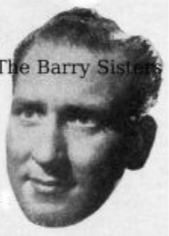
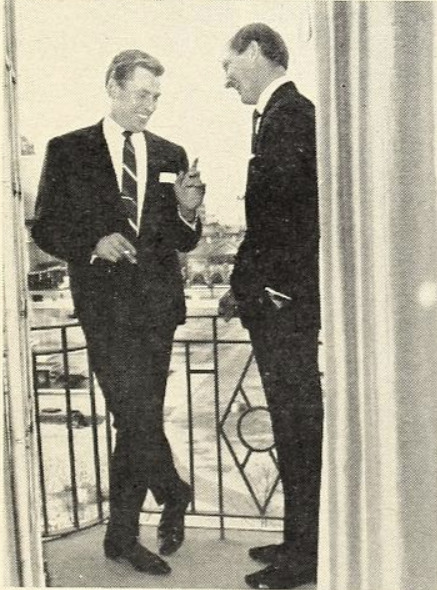
Here he is, the man of the hour, Kim Bennett - and I bet you thought that was the Barry Sisters! On the left, we see Kim Bennett's floating head from his days as a singer, and on the right, we see him fraternizing with Russ Conway circa 1967 - Bennett is in profile on the right. I've dug up some biographical information on the enigmatic Kim Bennett, and I wanted to share it here along with a little context about music publishing to make the accounts shared in the next section make mroe sense. If you're confident in your early-1960s music industry knowledge and know who Kim Bennett and Sid Colman are, scroll right along to Section 3.
I've cited Lewisohn a few times in this section when other sources weren't available. Every time I cite him, I put a quarter in the "Risky Citations" jar - once I've filled it a few hundred times, I'll take it to CoinStar and use the money to buy a copy of Fifty Years Adrift.
The Parlophone Contract Story is a story with many bit parts, most of whom won't appear until my next post--there will even be a figure! I'll assume you know the Beatles, Brian Epstein, and George Martin, the man who would become the Beatles' main producer. In the parlance of the times, George Martin was the A&R man (artistes and repertoire) of EMI's Parlophone label. As the A&R man at Parlophone, George M. has the head of the label, with duties including scouting artists, matching his stable of artists with songs, and overseeing the recording process.
Alongside record labels like Parlophone, Columbia, and HMV, EMI had other companies under its corporate umbrella. One of these companies was the music publisher, Ardmore & Beechwood (A&B).
Music publishers manage song copyrights; they make money by marketing and disseminating those songs. In the early 20th century, the big moneymaker for music publishers was sheet music sales. By the 1950s and 60s a sea change was in progress as record sales grew and eventually eclipsed the sale of sheet music. Just as the medium through which songs were sold changed, so did the way in which music publishers sold those songs: originally, song pluggers from publishing companies would pitch their songs to orchestras, brass bands, and dance halls, seeking out groups who performed live music, so that their audiences would go out and buy sheet music of the songs they’d heard (Southall & Perry 2006, p.ix-xii). With the rise of records, song pluggers would pitch their songs directly to A&R men; they would visit the A&R men in their office and sing the songs they had on offer, accompanying themselves on the piano while they did (Martin & Hornsby 1979, p.48). They could then market those records to sell their songs. If a song was recorded by multiple artists, as was often the case, the song publisher benefited regardless of which version of a song played. This set their interests slightly apart from record producers, who only benefited if their version of a song sold.
Let's illustrate with a Lennon-McCartney original: the music publisher for Lennon-McCartney's music, Northern Songs, would profit from both the Rolling Stones version of 'I Wanna Be Your Man' and the Beatles version, but the record companies would only benefit from the version they released - the Stones version meant money in Decca's pocket, while the Beatles version benefited EMI.
(I'm sure their are some additional business/contract complexities that come into play, but I believe the general principle is correct)
EMI Music Publishing would one day be a Big Fucking Deal, but when the Beatles joined in 1962, it didn't exist yet. Publishing was a minor interest for the company, and they had only a small publishing presence in the form of A&B, which opened in 1958 (Martland 1997, p.262). A&B was set up to handle the publishing interests of two American companies, Ardmore Music Corp. and Beechwood Music Corp., both of which were owned by Capitol Records (Cash Box 1958 Jul 26, p.34). Capitol Records had been purchased by EMI in 1955 (Southall 2009, p.25), and A&B was set up a few years later to handle their catalogue in the U.K., while also providing and option to publish through EMI for any interested songwriters. This was done at the behest of EMI Chairman Sir Joseph Lockwood (Southall 2006, p.9-10).
From its genesis, veteran music publisher Sid Colman (1905-65) served as general manager of Ardmore & Beechwood (Cash Box 1958 Jul 26, p.34). He would serve in this role until his untimely death in April 1965 (Cash Box 1965 Apr 24, p.47). You will encounter multiple spellings of his name, but Lewisohn assures us that Sid Colman (rather than Syd Coleman) is correct (2013, p.856). Kim Bennett served as his assistant and music plugger.
Born Thomas Whippey (1931-2004) (Lewisohn 2013), he became a Decca recording artist in 1954 under the name Kim Bennett. He recorded six singles, none of which charted. I haven’t found any of his work online, but for an idea of the type of music he released, here are other versions of two songs he put out: ‘Softly, Softly’ by Ruby Murray and ‘The Kentuckian Song’ by Eddy Arnold. He maintained a day job as an office worker until 1955, then briefly worked as a musician full time. He worked a season at Butlin’s (not the same location as Ringo), played some clubs, and toured with the Ambrose orchestra, but his career as a singer had petered out by late 1956. As Don Wicks puts it “[h]e was a victim of the growing rock and roll industry no longer interested in a soft pleasant vocal style.” (Wicks 1996 pt.1)
He resumed work at a toy warehouse, (Wicks 1996 pt.1) but later took a job in music publishing with B. Feldman & Co. Ltd. (Cash Box 1967 Jul 22 p.65). He began work with Ardmore & Beechwood no sooner than August 1958. He was still with Ardmore & Beechwood as of June 1965 (Cash Box 1965 Jun 5 p.55). By July 1967, he had moved to South Africa, where he ran a newly launched publishing company, Francis Day (S.A.) (Pty), which was established to manage copyrights of B. Feldman & Co. Ltd., Francis Day & Hunter, and Robbins (Cash Box 1967 Jul 22 p.65).
According to Lewisohn, Bennett spent his later years in Shropshire in “quite humble circumstances (Nothing Is Real, Season 7 Ep. 7, 29:30). He was interviewed by Lewisohn on July 27-28, 2003 (Lewisohn 2013 p.869). He died in 2004.
While biographical information on Bennett between 1967 and 2003 is slim (perhaps nonexistent), his role in the Beatles story received several mentions in print in those intervening decades.
Section 3: Kim Bennett in Beatles History
As I highlighted in my first post in this series, Kim Bennett was quoted in Beatles Book Monthly Issue 70, but that isn't his earliest appearance in the Beatles lore - he first appears in an earlier issue of BBM, issue 13, published in Augst 1964, p.22-3. He's mentioned by BBC DJ Ted King in relation to his work plugging 'Love Me Do'.
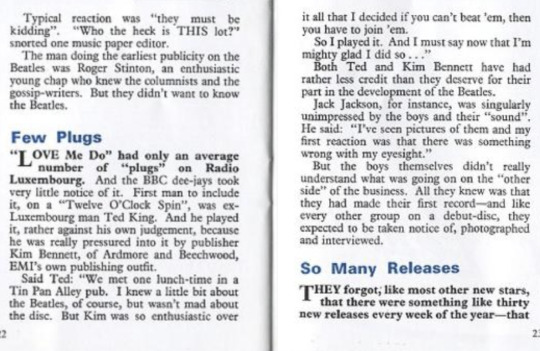
To summarize: Kim Bennett went to lunch with Ted King and pitched “Love Me Do” to him. King wasn’t fond of the record, but Bennett’s enthusiasm convinced King to play it on “Twelve O’Clock Spin.”
Our next Bennett sighting (and the first to use Bennett as a source) is the aforementioned BBM Issue 70, p.8, published May 1969.

This is part of a piece titled “When did you Switch On?” whose author is unattributed. Whoever they are spoke to Kim Bennett directly. Here’s what we can gather from this piece:
Kim Bennett was Sid Colman’s assistant
Colman “had quite a job to persuade George Martin to see the Beatles”
Bennett, presumably, was in the room when Colman “first heard the Beatles’ tapes”, since Bennett is able to relate what Sid Colman said on the matter
Colman decided to call Martin because he did not have a similar-sounding pop group, while the other EMI A&R men did
Bennett next crops up in several of Bill Harry's books, starting in 1982. Bill Harry is the founder of Mersey Beat and was an art school chum of John and Stu's; he's written a number of reference books about the Beatles, including The Beatles Encyclopedia, The John Lennon Encyclopedia, and The Book of Beatle Lists, among many others. Four of his books mention Bennett. The information in these books seems to be pulled from the two BBM articles highlighted above - with the possible exception of the last one. The books where Bennett is mentioned include:
The Beatles Who’s Who (1982): An encyclopedia of Beatle people. Bennett does not get his own entry, but he is mentioned in the entry on Sid Colman (p.84). Bennett is said to be Colman’s assistant, and his involvement in “Love Me Do” promotions is noted without detail.
The Ultimate Beatles Encyclopedia (1992): Bennett now gets his own entry (p.84-5). Again, this appears to draw from the Beatles Book articles. More detail is included here than in The Beatles Who’s Who. Bennett is mentioned again in Sid Colman’s entry (p.168). There’s a reference to Colman and Bennett liking the demos for “Love of the Loved” and “Hello Little Girl”, which is not mentioned in BBM above. However, these songs were referenced in relation to Sid Colman in The Beatles Who’s Who, so I think Bennett is just lumped in with Colman here.
Also in the Colman entry, Harry points out two conflicting accounts of the promotion of “Love Me Do.” George Martin wrote in his memoir that Ardmore & Beechwood did “virtually nothing” to promote the song, but Ted King, in BBM Issue 13, said it was Kim Bennett who got him to play the song on “Twelve O’Clock Spin.” This apparent contradiction will be discussed in detail when we deal with Tune In’s version of events, but for now, I’ll say this: it can be true that Kim Bennett did his best to promote 'Love Me Do' and acheived limited success while still falling short of the expectations of George Martin (and, crucially, Brian Epstein).
The Encyclopedia of Beatles People (1997): Bennett has a brief entry (p.45) and is mentioned in Sid Colman’s entry (p.92-93.) The Sid Colman entry includes this quote from Sir Joseph Lockwood about the Beatles’ publishing rights “I don’t blame Sid Coleman [sic], because he published the first two songs without a contract. He wasn’t getting any support from either the record producers or the solicitors.” This quote appears in Ray Coleman’s The Man Who Made The Beatles (1989), seemingly from an interview conducted by Coleman while researching that book.
The Ultimate Beatles Encyclopedia (Revised & Updated, 2001): The entry for Kim Bennett includes the entirety of the entry in the 1992 version with an additional two paragraphs (p.135-6). These paragraphs are emotionally charged and add information not available in the two articles from BBM. After detailing Bennett's involvement in 'Love Me Do' promo, Bill Harry writes,
“It’s ironic that the two people who were so enthusiastic about the Beatles and helped to get them with EMI in the first place were to have George Martin shut the door in their face by suggesting to Brian Epstein that he see Dick James about being their publisher. For one thing, it was Coleman [sic] who, after talking to Brian realized that the only A&R man at EMI who hadn’t rejected the Beatles was George Martin. Apparently, Coleman had a hard job persuading Martin to see Epstein. Even then, Martin wasn’t initially impressed by their sound. He only agreed to a test session at EMI’s No. 3 studio four weeks later, then another three months elapsed before the release of their first single. EMI and Martin weren’t even confident enough to give the Beatles a plug rating. Artists such as Cliff Richard received an ‘A’ plug on EMI’s Radio Luxembourg shows. The lowest was ‘B2’. The Beatles weren’t even given this low plug, EMI gave ‘Love Me Do’ a nil rating.
“So Bennett had a hard job pushing the record without EMI using their clout. As a result, Epstein refused Ardmore & Beechwood the future Beatles publishing. Had he done so, the Beatles might have retained the rights to their own songs, and Coleman might have received some acknowledgment for having placed the Beatles into his hands in the first place.”
It’s hard to say whether or not additional information from Kim Bennett made it into this article. Much of this could be pulled from other sources and presented through a negative lens stemming from Dick James’ involvement in the Northern Songs debacle. There are, however, two elements here that are consistent with Bennett’s later accounts that might suggest that he spoke with Bill Harry: (1) the phrasing that George Martin “shut the door” in the face of A&B, rather than Brian Epstein actively seeking out a different publisher and going to George for advice, and (2) the blame placed on George Martin for the Beatles low plug rating. Both new elements, and both inconsistent with certain other versions of events.
In Philip Norman's revised Shout! (2003), there is unambiguous evidence of Kim Bennett's participation.
In the original 1981 release, Sid Colman and A&B are mentioned, but not Bennett; in the revised edition, not only is Kim Bennett present, but the information surrounding him is clearly more than the familiar, regurgitated tale found in Beatles Book Monthly.
Norman doesn’t give citations, so I can’t say conclusively how he got this new information. There may be an interview with Kim Bennett published somewhere that I haven’t come across, though I’m inclined to believe either Norman or one of his research assistants spoke to Kim Bennett directly. The phrase “According to Bennett” appears a few times in Shout! (2003), which reads as if the information is coming directly from the horse’s mouth, so to speak.
Since the revised edition was published in the same year as Lewisohn’s interview with Kim Bennett, I considered that Lewisohn might have shared his information with Norman, and Norman may have rushed an edit. I looked for the exact publication date for the revised edition of Shout!—it was weirdly hard to find—and that put to bed any ideas of Norman cribbing off of Lewisohn’s notes: Pan Macmillan Australia gives the release date as January 9, 2003, several months before Lewisohn interviewed Bennett.
The Contract Story, as presented in the revised Shout! starts in the usual way: Brian gets an acetate made from the Beatles’ demo tape, the technician likes it and puts Brian in touch with Sid Colman, who works for A&B upstairs. Colman is interested in publishing the original Lennon-McCartney numbers. Then Kim Bennett enters the picture (Norman 2003, p.164-5):


Bennett likes the disc, too, and suggests they record the Beatles independently in the for-hire studio below their Oxford Street office. Colman takes Bennett’s idea to Len Wood, managing director at EMI, but it goes against protocol, and Wood won’t allow it. Only then does Colman put Brian in touch with George Martin. Colman and Brian have a “gentlemen’s agreement” that A&B will get the Lennon-McCartney publishing rights if they get a contract with George M.
It’s a short passage, but there are already a few problems here. First, the timeline doesn’t make sense. Most early accounts have Brian’s meeting with George M. occurring the day after Sid Colman hears the tapes (see A Cellarful of Noise, The Beatles (1968), and All You Need Is Ears). The largest gap is given by Lewisohn’s Chronicle (p.53-55), in which Epstein is said to have met Colman “around February 8” (a Thursday), with the Epstein-Martin meeting occurring on Tuesday, February 13. The Epstein-Martin meeting date seems to be pulled from George Martin’s date book (he has a meeting with a “Bernard Epstein” on that date), but I’m unsure what brought Lewisohn to the February 8 conclusion. Based on other information in the Chronicle, my best guess is either a meeting between Colman and Martin on February 9th, or a letter sent to Decca by Epstein on February 10th stating he had secured a recording contract. Whether or not he had met with Colman, Epstein certainly hadn’t secured a recording contract on that date – it was purely bluster, a kiss-off to Decca.
Regardless, even if Epstein met Colman on February 8th rather than February 12th, that’s a narrow window of time for Bennett’s story to occur. Rather than trying to place the group with an A&R man at EMI, Colman does nothing until his assistant suggests they record the Beatles themselves. This is unorthodox. A large part of the job of music publishers, as I’ve said above, is to pitch songs to A&R men to get them recorded. In this case, they’d be pitching a group along with the songs, but it seems strange that they wouldn’t try to work their contacts at all before making the jump to DIY. Still, let’s assume that happens. Colman takes the idea to Len Wood. Len Wood’s office at the time was probably at EMI House in Manchester Square, which isn’t far from A&B’s Oxford Street location, so assuming Len Wood had an open schedule, and Colman felt a high enough degree of urgency to immediately take Bennett’s idea to the managing director, I suppose it’s possible that Colman took Bennett’s idea to Wood, was immediately shut down, and then called Epstein back in to set up a meeting with George Martin if we assume Epstein’s first meeting with Colman happened on the 8th rather than the 11th. Still, it seems odd to me that these events wouldn’t turn up in Epstein’s account – getting shut down by the managing director of EMI Records is sort of a big deal, and would add to the drama of the everyone-rejected-them-but-George-Martin-story.
The other big issue here is that this version of events contradicts Bennett’s account from 1969. Rather than simply overhearing Colman’s conversation with Epstein and subsequent persuasion of George Martin, Bennett now has a more active, central role. He’s not driving the story, but he now gives a version of events in which he’s one of the Beatles’ earliest champions. I don’t think it’s unfair to consider that Bennett’s increased involvement in the story might indicate an interest in being more than a footnote in Beatles’ history.
Bennett is mentioned again during the promotions of ‘Love Me Do’ (p.182-3):


Bennett secures some airtime on Two-Way Family Favourites by “repeatedly nagging a radio producer friend.” This is not the same radio show mentioned in Beatles Book Monthly Issue 13 (above), but it’s in keeping with Bennett’s role as a plugger—and that’s where Bennett’s involvement ends in Shout! (2003). There’s one more tantalizing mention of Brian’s “gentlemen’s agreement” with Colman, which he breaks due to his dissatisfaction with A&B, turning to George Martin for publishing advice.
There you have it: Kim Bennett’s evolving story pre-Tune In. It starts as a bit of extra detail that fits inside the greater framework of the Beatles’ Contract Saga, and, after thirty years, morphs into something that contradicts Bennett’s earlier version and the many other accounts of the same events. Things will get even stickier once we get to Tune In. But first...
Section 4: Why Does It Matter?
I can think of three explanations for why Lewisohn pitched Bennett as an unheard witness when he had, in fact, gone on the record before, and none of these explanations helps the credibility of the story.
Explanation 1: Neither Lewisohn nor Bennett knew about Bennett’s previous statements on the matter. This would be extremely damning for Bennett’s reliability, as it would mean he had forgotten both his 1960s statement to Beatles Book Monthly (plausible) as well as the interview that led to the information included in Shout! (concerning). This scenario also requires Lewisohn to be unaware of the above Bennett appearances, which doesn’t reflect well on his abilities as a researcher. If you find someone who you think has never been on record, you might want to at least look him up in the glossary of books by major Beatle authors.
Explanation 2: Bennett knew; Lewisohn didn’t. Perhaps Kim Bennett either neglected to inform Lewisohn of his past interviews, or outright lied to him on the matter. Lewisohn says that Bennett is “known for a dogged persistency” (Lewisohn 2013, p.571), has said that Bennett “just picks something up and he will not let it go,” (Let It Roll 2020, ~25:50), that he is “very insistent about things” and by the time Lewisohn interviewed him, “was a very frustrated man because no one had ever paid him the attention that he felt was his due.” (Nothing Is Real S7Ep7) Could this tenacity and feeling of entitlement to a part of the Beatles’ legacy have led Bennett to present himself as a bigger scoop than he really was? Might he have sold Lewisohn a tale of exclusivity and, perhaps, a version of the Contract Story more salacious and headline-grabbing than the truth?
Again, this explanation also hinges on the idea that Lewisohn was in the dark about Bennett’s prior interview(s), which is a huge oversight, but not as damning as explanation 3.
Explanation 3: Lewisohn knew and lied. Whether Bennett told Lewisohn outright that he had been interviewed in the past or if Lewisohn came upon that information in his research, Lewisohn chose to portray his interview with Bennett as exclusive. Perhaps this was purely to make his “scoop” seem juicier. Perhaps he was reluctant to give Philip Norman credit for finding Bennett first – there seems to be no love lost between Lewisohn and his former employer. Or perhaps Lewisohn knew that Bennett’s prior accounts made the story told in Tune In less credible. The early anecdote related in BBM already conflicted with the revised version in Shout! – if Bennett’s account, as related in Tune In, presented further inconsistencies, it would undermine Lewisohn’s major finding.
I’ll close with a segment from one of the better Lewisohn interviews I’ve heard. It’s from Ken Michaels’ radio show ‘Every Little Thing’, conducted in ~2013, and it’s one of the rare instances where an interviewer gives Lewisohn any pushback or asks follow-up questions regarding some of his more explosive claims. It’s an uncomfortable listen – Ken Michaels even appeared in the comments of this YouTube channel to counter claims that he has beef with Lewisohn– but satisfying to hear some meaningful questions when so many people are content to simply deify Lewisohn. Here's the relevant exchange:
youtube
KM: Aren’t there also problems with certain people that you’ve interviewed that have played some part in Beatle history that want to really elevate their status?
ML: Oh yeah, oh yeah, and it’s up to authors to ensure that they don’t get what they want. And there are unfortunately too many authors who just very happily take the stuff they’re given without challenging it. You’ve got to challenge all these things. And unless something completely fits into the framework of the story, you can’t use it.
Next time, on Days of Our Lies: the Classic Version of the Contract Story, and why Mark Lewisohn is so intent on debunking it. After that, we’ll finally look at the Contract Story as portrayed in Tune In.
Sources:
Cockcroft S, Carty J. 2023 Feb 14 [conducted 2023 Jan]. Nothing Is Real – Season 7 Episode 7 – Mark Lewisohn Returns [podcast, season 7, episode 7]. Nothing Is Real. 1:17:15. Available from: https://open.spotify.com/episode/5mtbNIreAY0Car6VASuZGV?si=b1e322e001a347e3
Coleman R. 1989. The Man Who Made the Beatles: An Intimate Biography of Brian Epstein. New York (NY): McGraw-Hill Publishing Company. 400p. Accessed online 2024 Mar 19. Available from: https://archive.org/details/manwhomadebeatle00cole/mode/2up
Kelly D. 2014 Jul 30. Setting the Record Straight: Interview with Beatles biographer Mark Lewisohn. Critics at Large. Accessed 2024 Mar 4. Available online: https://www.criticsatlarge.ca/2014/07/setting-record-straight-interview-with.html
Kozinn A. 2013 Dec 27. Tune In, and Turn On the Reading Light. ArtsBeat: New York Times Blog [accessed 2024 Feb 6]. Available from: https://archive.nytimes.com/artsbeat.blogs.nytimes.com/2013/12/27/tune-in-and-turn-on-the-reading-light/?_r=0
Lewisohn M. 1992. The Complete Beatles Chronicle. New York(NY): Barnes & Noble Books. 365p. Accessed online 2024 Mar 14. Available from: https://archive.org/details/completebeatlesc0000lewi/mode/2up
Lewisohn M. 2013. 1st U.S. Edition. The Beatles: All These Years Vol. 1: Tune In. New York (NY): Crown Archetype. 932p.
Lichtman I [editor]. 1965 Apr 24. Great Britain. Cash Box XXVI(40); International Section p.45. Accessed online 2024 Mar 18. Available from: https://archive.org/details/cashbox26unse_31/page/44/mode/2up
Lichtman I [editor]. 1965 Jun 5. Great Britain. Cash Box Vol.XXVI(46); International Section p.55. Accessed online 2024 Mar 13. Available from: https://archive.org/details/cashbox26unse_37/mode/2up
Lichtman I [editor]. 1965 Jul 24. Great Britain. Cash Box Vol. XXVI(53); International Section p.53. Accessed online 2024 Mar 13. Available from: https://archive.org/details/cashbox27unse/mode/2up
Lichtman I [editor]. 1967 Jul 22. Overlooking South Africa. Cash Box Vol.XXVIII(52); International Section p.65. Accessed online 2024 Mar 13. Available from: https://archive.org/details/cashbox28unse_50/mode/2up
Martin G, Hornsby J. 1979. All You Need is Ears. New York (NY): St. Martin’s Griffin. 293p.
Martland P. 1997. Since Records Began: EMI: The first 100 years. London: B.T. Batsford Ltd. 359p. Accessed online 2024 Mar 17. Available from: https://archive.org/details/sincerecordsbega0000mart/mode/2up
Michaels K. 2013. Mark Lewisohn interview [radio broadcast episode]. The Beatles – Every Little Thing. Originally aired on XM Radio. 1:53:18. Available from: https://www.youtube.com/watch?v=CjAUtngSoKc
Parnes S [editor]. 1958 Jul 26. Ardmore & Beechwood Open London Office. Cash Box Vol. XIX(45); p.34. Accessed online 2024 Mar 18. Available from: https://archive.org/details/cashbox19unse_43/page/34/mode/2up
Southall B, Perry R. 2006. Northern Songs: The True Story of The Beatles Song Publishing Empire. London: Omnibus Press. 218p. Accessed online 2024 Mar 13. Available from: https://archive.org/details/northernsongstru0000sout/mode/2up
*Wicks D. 1998. Updated 2012. The Ballad Years: From the Bombs to the Beatles: a Directory and Discography of British Popular Music-makers from 1945-1960. Accessed online 2024 Mar. Available from: https://archive.org/details/theballadyears/Book%20Contents/
Wilcox N. 2020 Apr 27. How The Beatles Got Signed [podcast, season 7]. Let It Roll. 57:21. Available from: https://dcs.megaphone.fm/PAN2878353172.mp3?key=5204cb23c38410bae94e208461239e2d&request_event_id=e800ecea-9c5e-40f2-90e3-dad820306501
Images from The Ballad Years and Cash Box 1967 Jul 22
*The Ballad Years by Don Wicks was originally published circa 1998 (by a company called In Tune International, of all things!) There is some great contextual info included at the Internet Archive link; to condense it here, after the original print run of the book, Don Wick continued to update the book, primarily to reflect the death of artists. He distributed these via Microsoft Word Document, and the 2012 version of these documents was uploaded to the Internet Archive. I believe that is the reason for “The Barry Sisters” being plastered across Kim Bennett’s face – the pages including artists’ pictures have very wonky formatting.
#mark lewisohn#the beatles#tune in#kim bennett#sid colman#ardmore & beechwood#it's TOO LONG but what can ya do#bless you if you read this whole thing
35 notes
·
View notes
Text
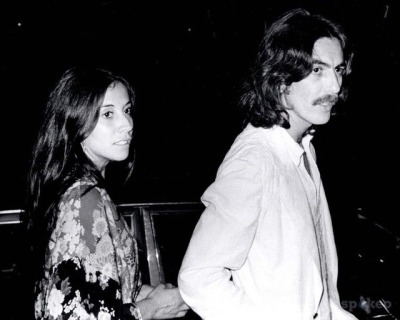
Photo © Newscom.
Q: “But you do exercise free choice and you have chosen to do with your life what you’re doing with your life, to express yourself with your music and to try to tell other people.”
George Harrison: “To a degree but… I, I don’t really choose — I mean, this is a funny thing to say, in some respects my life, to be me I’m not sure if it is a blessing or a curse, you see, because the blessing is that you’re rich and famous and all this looks rosy but on the other hand behind the scenes to know what then you expect from yourself by knowing what you know through being what you… that’s the thing of learning and knowledge, and then of what others expect of you, and then all the million situations you get involved in by being that person. You know, this goes like anybody who goes through a similar sort of situation, then in some respects it’s a pain in the neck.”
Q: “Is it sometimes quite lonely?”
GH: “Sure, sometimes it is. You know, sometimes it’s hard, you just like to be anonymous, you know, sometimes I just like to be invisible, even after ten or whatever, twelve years of that, I still find it… I can’t even go out — if I wanna go out and watch somebody singing at the Roxy or something, I go in there and it’s like, it’s like the club tilts, you know, over and I become part of the show and that’s amazing after all that time. Sometimes it’s nice to be invisible and just go out and just be nobody.” - radio interview, August 1975
“[W]e all have concepts of each other, you know? And the concept is that somebody see me on a plane or in the street or something, and they immediately, they remember all this Beatle stuff and they have this concept of me as that person. But, but in reality, I don’t go around thinking of myself as George Harrison, the Beatle or whatever, I — you know, I do now, ‘cause I’m on the television, but normally, I’m just like you, you know, just like everybody else — I’m just a human, and sometimes you have to, rather than just be ordinary, you have to, you know, make an effort to be more ordinary, inasmuch as they will calm down and try to see that there’s actually a person in here other than this big myth about The Beatles, you know, that’s all.” - George Harrison, The Midday Show, February 1988
“People used to say George was a recluse, but he would say: ‘well, I just don't go where you go,’ or ‘I don't go where the press is, or to those sorts of places.’ We had a lot of friends and had quite a social life. You can put on this other persona and be low key about it. We never travelled with anybody, we just went on our own. George travelled on his own. The less attention you call to yourself the easier it is. That was his philosophy.” - Olivia Harrison, The Australian, March 3, 2005 (x)
#George Harrison#Olivia Harrison#quote#quotes about George#quotes by George#George and Olivia#1975#1988#2005#1970s#George and fame#The Beatles#fits queue like a glove
84 notes
·
View notes
Note
Hi! I know you were mostly joking in your posts but I'm actually fascinated by the Cute Beatle phenomenon that you mentioned - the prevalence of hurt! Paul fics, the whole Paul is Dead thing ( I have seen someone call it the modern day version of the archetype of the beautiful youth in myths who dies young and is subsequently immortalized) or even the way (straight) men describe him. Do you have any serious thoughts on what exactly about Paul has inspired all this? Is it just his looks?
Hi :) This may be a sort of simplistic answer but I think, in very general terms, it stems from the fact that Paul's good-looking/famous/rich/talented/powerful/loved by the masses/basically lived the dream life combined with the fact that he's sort of just a massive egomaniacal cunt?
So the phenomenon, I think, comes from people trying to reconcile being attracted to him while also sort of disliking him for various reasons. Like a person gets drawn to him and can't help but feel affection to him because of his looks/talent/personality/whatever but they also want to see him suffer/get knocked down a peg for once in his life. And because Paul's rotten to his core and infinitely more powerful than all of us then nobody has to feel guilty about disrespecting him lol. Being able to take your issues out on somebody is always nice and Paul's a perfect target.
The way some straight men talk about him feels slightly different. I don't get the vibe that a lot of them actually know about Paul's crimes or care, I think they're just weirdly demeaning to him or talk about him in homophobic/feminizing terms as a way to reconcile finding him attractive without hurting their own masculinity. There's also a strong degree of jealousy if you're talking about people like Ph*lip N*rman lol.
#this is essentially psychoanalysis based on stuff ive specifically witnessed so take it with a very heavy grain of salt#ask#the beatles
37 notes
·
View notes
Note
Ooh if you’re still taking numbers for the prompt thingie, 14! I adore your writing so much!
"Talk to me, prithy, I know you hath something stuck in that throat, and it's not ocean."
She stares through his soul before ducking her head into the wafts of her hair, scooting backward in aqua and shadow.
No avail.
"Well, fuck." Eddy sighs, sitting down in front of the glass coffin, boots spread.
Don't open the crate. They had decreed. An extra sixty pence for him to turn his eyes away and whistle over his morals.
He'd taken the gold and opened the crate anyway, as soon as he was out of the city walls.
And it was a fucking mermaid they had him smuggling. A siren of the sea. A Poseidon witch. A femme enchantress who robbed men of mind and blood before drowning them at the bottom of the darkest trenches.
She looks terrified.
But isn't that part of the play? She's the most ethereal beauty he'd ever seen in his life, just likes myths said they would be. Then her glowing blue eyes and milk skin framed by golden floss hair was all just the meat under a propped up box with a stick. She'd use them to lure him to a watery death and lay eggs in his chest… or something.
He doubts she could drown him in less than a trough of water, though. It barely reaches past her shoulders. And she had no space to turn or fold, let alone swim or kill.
She's stationary and shivering. Stolen and smuggled.
And Eddy doesn't smuggle people. And… Mermaids were… people shaped enough to fall under that honor code. Exotic birds of fire, beatles made of gold, and dogs that could bark open portals—sure. If the buyer liked animals and not just greed.
His normal fare is usually just illegal spices for the recreational minded. Liquors that controlled dreams for something to relieve a wounded day. Rare books with incantations for better genes and the like. Maybe some rare weapons and metals when he was in a legitimate mood.
Buying and selling people was sadly common and sadly profitable but not so sadly in his repertoire.
Til' now.
Accidental, promise. And the bad taste he'd had since stepping foot in the Duke Brenner's caste of forbiddens was a pretty big foreshadow, but one he could feel a rebellious itch against. Something that told him to take the job and ruin it.
So here he was, in the back of his caravan with an open crate to a mermaid case outside the forgettable village of Pitty Glen, ruining it.
Pitty Glen, because it is the complete opposite direction of the High Lord Creel's manor he's been directed to take her to, and it's also where his pseudo boy lives. Boy as in knave. Though smugglers didn't technically have knaves, they had accomplices.
And Dustyn Son of Hender was a good one of those, with his endless tomes and scrolls of legend and mysticism.
"Verily, let's… see what we have here." He waves the Books of Seas at her.
She bobs ominously in response, siren eyes illuminated like foggy moons. Her eyelashes clump, wet and golden, and the effect is such a detail of humanity. Eddy finds himself staring at the contrast of her very real details to her very unreal ones. The pearlescent skin pressed gently with patterns of scales that come and go with the refracting light. The golden thick of her tail, adorned in flimsy paper wet fins, pink and waving like a lady's chiffon wrapped around her. And the sparkling stones man made and otherwise crowned over her hair. Brooches and coral and pearls and possibly the broken chains of a man's pocket watch—like she had maybe slaughtered some humans and created jewelry from their leftovers as souvenirs.
"Apologies, good fuck, let's just—" Eddy pulls his eyes away because it's rude to gawk at a woman even if she probably eats people. "...see if anything in this blasted thing helps our dialogue."
Turns out the trinkets aren't souvenirs but status.
Mermaids are actually pretty courtly, even despite the book's pages being littered with illustrations of naked beautiful women with large gnashing teeth and bloody claws—Eddy doesn't appreciate the over exaggeration of their gruesomeness, and flicking his gaze up to the even flow of her sineous scales, hair, and tail: the under exaggeration of her countenance.
They apparently make trade and fashion with each other by gifting all things… sparkling. Shiny was the only name on their currency. And the more one had, the more high up the court they were.
"So, you're a mermaid lady-in-waiting? Or maybe a duchess of some reef?" he asks, flipping the book to spread its pages against the glass to show her the drawings of different mermaid treasure jewelry.
She shrinks at first, the underwater jerk fluffing her chest, curls, and gems. But then she's bending close, touching her own little tiara of compasses and rubies.
Eddy stands, looking about the crates and baskets of his caravan, past the other cargo he'd taken on of opiates and weapons, shuffling through his own cot bedding and trunk to find something suitable. Something sparkling.
"I suppose maidens' love for bobbles is true on dry or wet land, ha!" Eddy barks, watching the aquarium case rock with her obvious excitement. She tries to follow the book when he takes it back. "Greetings, condolences, compromises, forgiveness, so forth, so forth—are begun with such gifts. Greedy! But understandable. I too, start all my friendships only if they pay tribute. Granted, I don't have friends, I have customers but…"
A metal brooch clatters to the floor, stopping beneath the wedge of his boot.
The Templars sword and sheild.
He picks up the richly engraved cape closure and frowns.
"Well, it's not like I fucking need it anymore," he tells it and himself.
When he comes back to the coffin, the siren’s webbed fingers splay on the glass. Long sharp knives’ end nails tapping lightly as she peers close to see what he’s doing.
“Whoa, terrifying. Verily, the book is… not wrong then.” His eyes dart to the codex again and the drawings of bloody, horrible ends to the men who trifle with these creatures.
But she looks curious. Innocent. Absolutely entrancing.
Gold all over and blue where it counted, she’s the sea itself in the space of refracted light. Even the junk in her hair she’s collected does it’s job, shining and glittering to match the deepness of her eyes and the wetness of her lips. Wetness of her lips—she’s in water, you absolute buffoon. Still. Entrancing,
That’s the point, that’s the point, that’s the point…
He shakes himself. Murderous mythical creature or not, he’s not selling her to some high bidder who will display her in a dining hall for lords and ladies to gawk at for the rest of her life before someone decides they haven’t tasted mermaid morsel or some lord deems her fit for a deadly romp.
And he can’t help her return to… wherever she hails from if he can’t commune with her.
So this.
Flashing the brooch at her proves worth it. The water inside splashes with her excitement, her eyes on the shine with rapt attention so much so she doesn’t notice the case above her pry open. Eddy drops the metal inside and yelps back when she twists and jumps upon it.
“F-for you! Dear… lady. Y-ye! You fancy that? It's a gift! Want to keep it?”
Curled in her palms, she grins.
Oh.
“Ohhhhhhhh….” he wobbles, staring at her teeth. The incisors are familiar. Flat like his. her canines and the rest however… Sharp and long. A beautiful skin she has, wrapped tight around a body made for destruction. Like engraved plating on a blunderbuss. Gem-encrusted sheaths on blades. Many, many, many blades. “You... you must need those… for something, then.” Egads.
She ignores him though, too busy closing her eyes to focus on attaching his old Templar’s medal to the collection in the crown of her head.
Eddy picks up the book again quickly, reading fast down the passage of gifts. “...once received, placement of parcel upon each siren is denotation of class… huh, hmmm… wrists, no, necklace, no…. hair! AH–”
Royalty.
“Oh, oh no. Oh… god.”
Royalty. Only those of high lineage within the matriarch may crown themselves.
Mermaid… princess.
“Y-you don’t think that would look nicer on, perchance, a lapel or, or, or an earring or—”
She blinks at his rambling, smiling with such grace and poise he’s only getting more and more upset.
Then she opens her mouth again.
But this time he’s not distracted by the fangs as much as he is the note. The singular, sweet, unearthly, and altogether unworldly note of music. Of voice—nothing of any sheet he’d ever known, and he’d known them all. A high-pitched, low-pitched, tuning fork flicked against the chords of time and space and heavens.
Around them, the caravan wobbles in color and picture, and Eddy falls back on the slats, dizzy as the world around him tilts, reverberates, and her face illuminates with a literal sun behind it—Golden and perfect. Oh, mighty sun, sweet maiden, to go to her and let her have him—! To allow him to sink into that noise. He would be so happy, so content—
Whoa—what?
“S-STOP! Stop, stop, stop!”
Her shoulders jerk, teeth snapping shut.
“N-no singing! Uh—”
Singing. Siren. Mermaid. Ships crashing into rock and men getting their face pried off for egg nesting. Bad.
“—I, I’m not, I don’t really enjoy music and, you're not really in pitch for that… diddy. Sorry. I’m pretty particular about… I have a sensitive… bard’s ear…”
She stares back at him, hands wringing through her hair fast and uneven, looking very much like a girl he’s yelled at and now was insulting and not a vile witch who’d just tried to enthrall him into a cannibalistic ritual.
“S-Sorry. Let’s. how about we just… we’ll wait to sing until you know. Never, maybe.”
At least not until he put her back in water and sailed weeks away from her.
He puts his hand on the glass for recompense, eyes still dizzy with her beauty and whatever that had been.
And… incredibly, without prompt or circumstance, she does too.
Calm and graceful, and smiling full of needles and joy, she matches his rounded, thick fingers with her delicate points and laughs.
And it sounds… Boy, does it sound.
Eddy cries to it. Quite literally the sound of it yanks something up his throat and past his nose until he’s spilling tears. He feels magic in his veins. And not in a dreamy pathetic poet way—no, magic, scroll-full magic with history and weight in it that he knows for sure she is doing it.
“M-maybe no laughing either princess,” Eddy says, scrubbing his tears away with his hair. “That mayhaps be best!”
She laughs again and he curses as he puts his head in his knees and sobs past his own barks of mirth at the ridiculous situation.
He cries and laughs and stares at the wood of the caravan floor and her again, shining and sweet—and h-how?
How in the realm did he get himself into such a mess? Such a divine mess?
Or is that the Siren’s song talking?
61 notes
·
View notes
Text
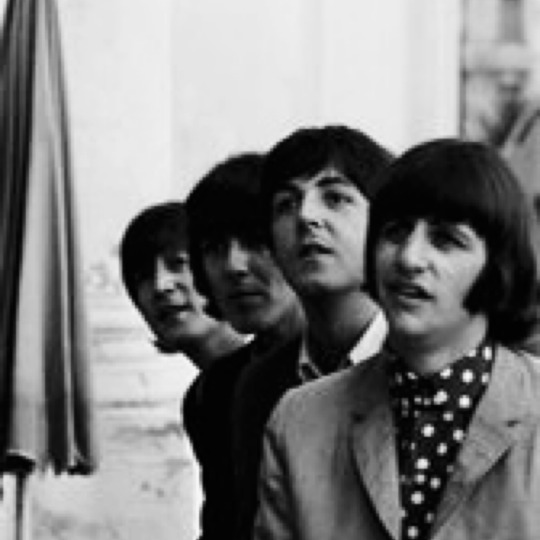
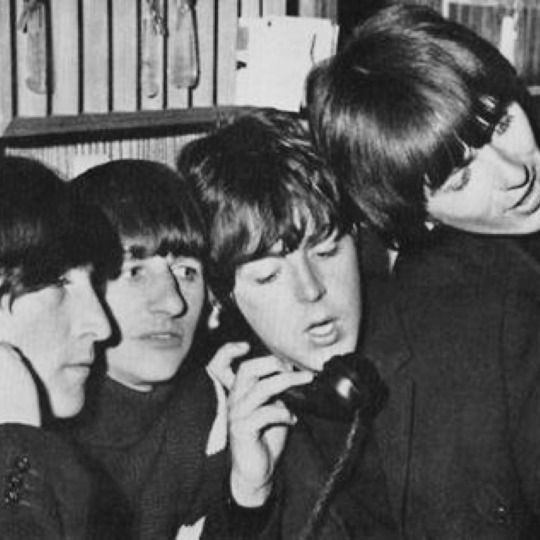

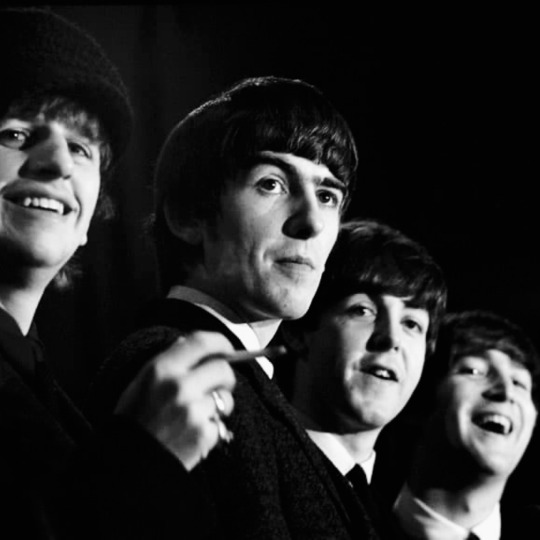
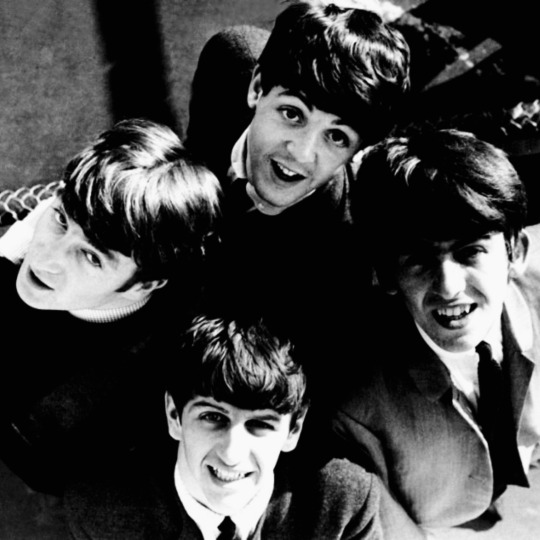
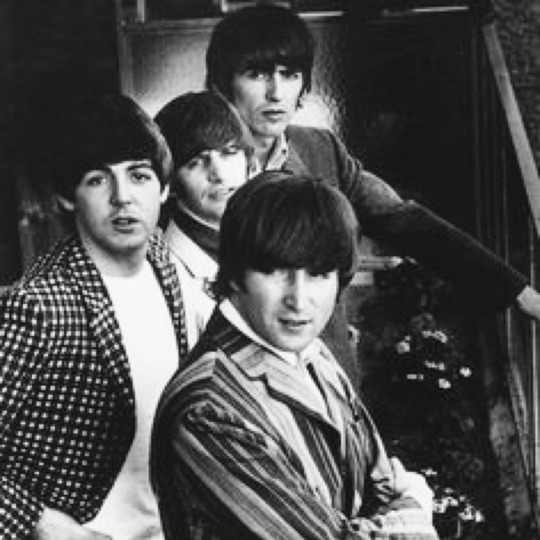



Do you believe in the myth of the Four-Head-Monster™ ?
It helped that we were like a gang together. Mick Jagger called us the Four-Headed Monster because we went everywhere together, dressed similarly. We'd all have black polo-neck sweaters and dark suits and the same haircut, so we did look a bit like a Four-Headed Monster. - Paul McCartney (The Beatles Anthology)
#they were best friends 🥺#the Beatles#Paul McCartney#John Lennon#george harrison#ringo starr#mick jagger#1960s#60s#the bugs: a series#things Paulie said
418 notes
·
View notes
Note
re: your post about j/p competitiveness - imo John certainly felt very insecure about Paul getting ahead around the late 60s, but when I see something like how he acted in Get Back I just don't see someone that has to be the top dog, my interpretation is more that he felt it was no longer a partnership - and honestly, I don't think Paul meant any harm by it but I completely see why he might feel that way.
I'm probably projecting too much onto him here but personally I like competitive partnerships until I feel like I can't compete and then it's painful just being around that person, and I've always thought that's what happened with John. He seemed to me like someone who wanted an equal, but imo Paul took to fame and its stresses a lot better and thrived in it while John floundered, feeling increasingly left behind.
Really good points! I totally agree about John in Get Back, to me he comes across as patient and tolerant and sweet (if a bit out of it sometimes). I can't imagine that John desperate to be the alpha male or anything. But then again, I can't imagine that John doing or saying a lot of the things he's known for, you know? I can't imagine him gleefully asking for a divorce or releasing HDYS. He is way less aggressive/macho than so many anecdotes and interviews would suggest, so it may be that it was an atypical time or certain aspects of his behaviour are more occasional than it seems.
In regards to leadership, there's so many conflicting claims about it... Some say it didn't matter, some say it was his ultimate concern, and there's a weird fetishization of John as leader among some (cough Lewishon) that makes it hard to tell what the reality was and probably influences my thinking. Maybe it was less about wanting to be boss and more about just wanting Paul to give in for once, let him have some things he really wanted. Maybe Klein gassing him up and treating him as the most important Beatle triggered a renewed expectation that Paul defers to him.
And yes I definitely think John felt it was no longer a partnership, after the breakup he was going around calling Lennon-Mccartney a myth and fake, lying about how they never wrote together because it felt that way to him, etc. He seemed very disillusioned about their relationship.
18 notes
·
View notes
Text
Songs that make me think of Simon Wet Cat Petrikov because he’s giving me brain rot and I’m gonna make it everyone’s problem. I make really weird playlists.
#thank you for putting up with me#playlist#adventure time#fionna and cake#adventure time fionna and cake#simon petrikov#character playlist#Spotify
24 notes
·
View notes
Text
Who is alive?
This all feels very much like the rumors that swirled around the Abbey Road album by the Beatles. There was a whole lot of speculation that Paul McCartney was dead because he wasn’t wearing shoes in the picture, among other details.
So, let’s look at the crackpot details:
Barnaby is dead. (theory) details taken from r/welcomehomeneighbor or r/welcomehomearg (I will post the user details when/if I find them.)
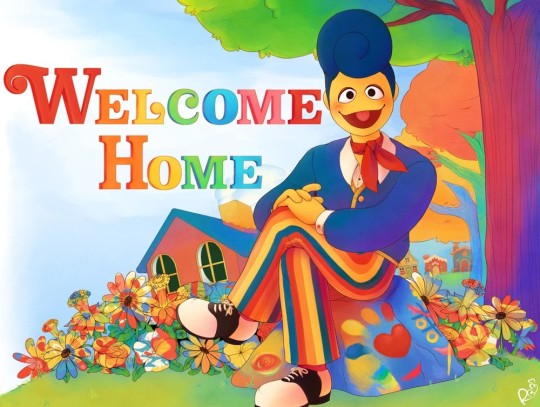
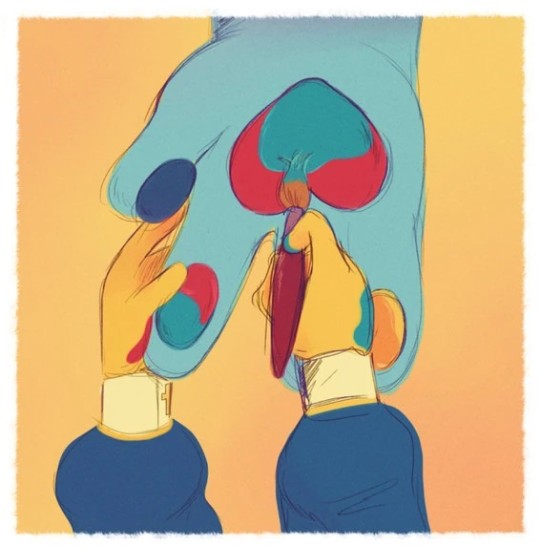
In the first image, Wally is sitting on a rock. The rock is blue, and appears to have a hand and arm. The colors on the hand are similar to the drawing of Barnaby’s paw that we see. The paw is open with the palm up, based on the art of the paw and the color of the pads. It looks like Barnaby has a red slash across his wrist. There is a tic tac toe board on what would either be his back or belly. I haven’t gotten to the tic-tac-toe parts yet, but my assumption is that the colors of the tic-tac-toe marks tell us something as well. Using that theory, this game would be between Frank and Julie. The colors kind of blend, so it is hard to be certain here.
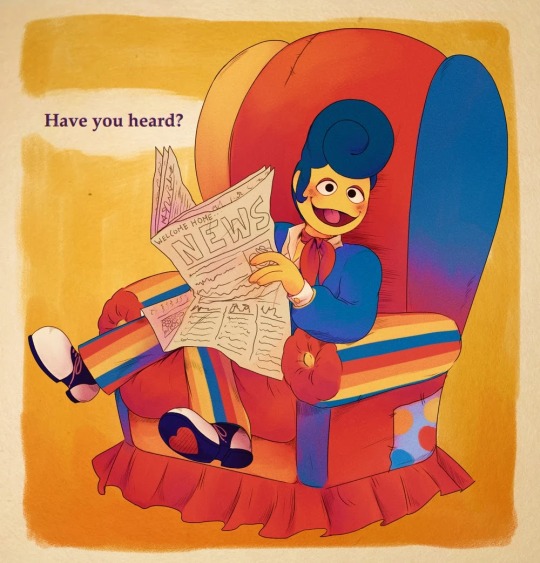
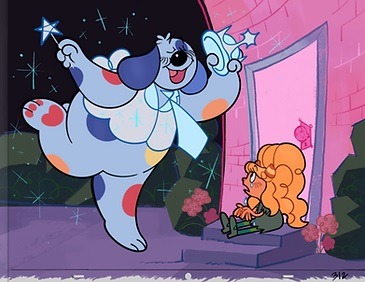
Then, we have a drawing of Wally on the News page, which seems on the up and up. It’s a news page, everyone loves Wally. So we have a drawing of him sitting in an armchair, reading a paper. The armchair has a detail that is very suspicious. The patch on the chair has a polka dot pattern that is closely associated with Barnaby. Could this be Barnaby’s skin? When you look closer, you can see that Barnaby’s face is on the newspaper. I have seen speculation that this is a missing persons type article or death announcement, but Barnaby could very well be included in some Welcome Home paper for about anything.
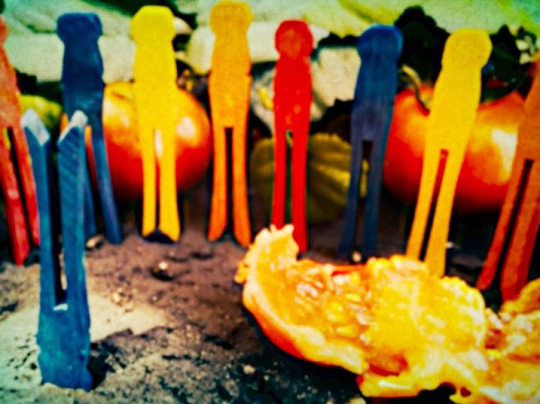
The clothespins in a secret video: the Barnaby/Frank video.
There are a row of clothespins that look like people. I’ve always thought those type of clothespins look like people. It looks very much like they are made up of a head, trunk, and legs. There is a row of pins, almost like a semicircle, around one pin (upside down), and a destroyed tomato. (Barnaby gets tomatoes thrown at him.)
In the video between Frank and Julie we have dialogue about bugs eating the vegetables and what should be done about it, but in this video, Frank and Wally are having some garden time together (with Wally’s view very low, as if he is laying on his belly while looking at the tomatoes) as Frank teaches Wally about how these blue flowers require a basic soil, and how pine straw shouldn’t be used for these flowers. I think these are hydrangeas, as they appear pink, purple, or blue depending on the acidity of the soil. (according to google, hydrangeas are unique in this way. Blue equals higher acidity, pink equals lower.) According to The Spruce, the idea that pine needs lower ph or acidify soil is a myth (I don’t know if that is relevant.)
Frank and Barnaby have an unfriendly conversation here. Granted, these characters are foils, with Frank being meticulous and fussy and Barnaby being super casual and joking all the time. It appears that Barnaby’s only activity that gets discussed throughout the website so far is that he goes around telling people jokes, hanging out with Wally, and chasing Eddie around the neighborhood. The chasing thing, at least, could be a reason for Frank to be put off by Barnaby, but it could just be the fact that they are so different.
Frank is so done with Barnaby from the beginning, (which I totally get because pun runs are pretty much the worst) and it quickly devolves into Frank being catty about the color of Barnaby’s fur, and he actually seems to kind of take offense. Barnaby continues to punish us all with puns until Frank makes him leave, and says “I don’t understand why you like him, W…”
During the video clips so far, we have seen Barnaby interacting with different people. He and Howdy get along because of the jokes, but I don’t trust either of them, especially given the way Howdy sells fake food to Sally (I will discuss at some point.) Barnaby is pretty awful to Julie, telling her that her joke is terrible and she can’t tell jokes. Barnaby chases down Eddie to get his packages, even though Eddie has apparently told him time and time again that he has to put it in the mailbox (I don’t know whose policy, maybe just Eddie’s?” And in the final clip of the day, Barnaby is talking to home about everyone, being snarky and unkind, to the point that home seems to be disapproving.
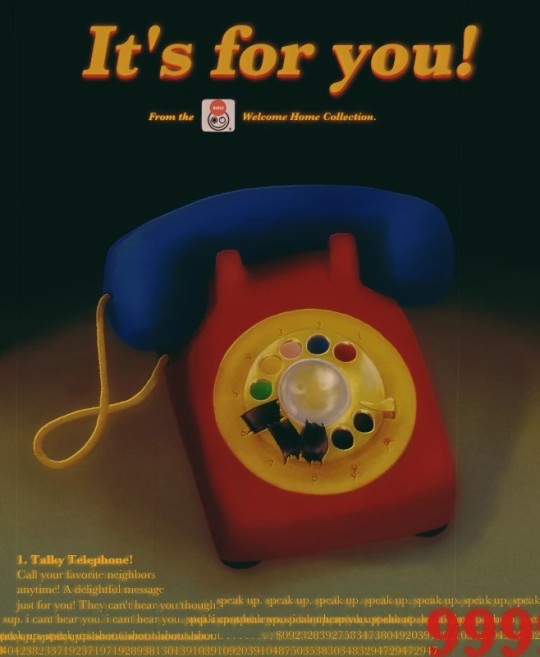
Back to some non-canon art.
As an early representation, we only see five colors on the phone: Wally, Barnaby, Julie, Frank and Poppy. The covered entities could potentially be dead/gone/erased. Home is not included as a neighbor, which continues. Two options on the phone dial are blanked out, as well.
It could be that color nuance is removed in the grainy footage, but it might mean something specific that those colors are there. If the video goes back up, I will get the full order of colors.
The tomato in our video image have been demolished. They are completely open and spread out on the ground. The tomatoes behind the row of figures are whole and look healthy enough. This could be pointing to the death/destruction of our upside down clothespin friend and the neighbors being the line of defense between certain destruction and safety.
9 notes
·
View notes
Note
We have spoken about it lots of times before but is it even really an achievement for Harry if he puts out a song and it is a hit. No matter how bad the song is, no matter how bad his album is, it’s going to be a hit. It will be played a million times on radio and will be on top of any playlist imaginable. Not because it’s good, only because it’s released by Sony Columbia under his name. His last album was so bad that his own fans were calling it a spoof album when it was leaked. That it couldn’t be the real album he was putting out. Then when it became official it was treated as Jesus’ second coming.
Yes, Louis has to swim against the tide but at least that will keep him motivated to put out music he really feels like creating, that he really feels like putting out. He doesn’t atleast have to sing songs about women’s vaginas while also pretending to be gay in front of a brain dead audience.
Louis has this freedom, which he’s talked about at concerts. His audience allows him the breadth of exploration and experimentation to keep his musical mind sharp, and to keep making music that both he and fans will like. He’s a musician making music, not the latest trend wagging the “musician” as we so often hear on the radio.
The other day I heard a song from Harry’s House for the first time (something cinema), and tbh I didn’t recognize that it was Harry until almost the end of the song. On first listen, it wasn’t bad or good. The song was like any background music that someone uses to promote an IG reel or TikTok makeup tutorial: a generic, inoffensive copy of an idea someone had decades ago, with a hook that repeats ad nauseum.
To be fair, pop music isn’t the Mona Lisa and most of it is generic and derivative. Art is hard. Originality is hard. Beauty is subjective and almost impossible to do commercially.
The Grammy has become an award given by industry to reward its pet projects. The votes are meaningless. There is no integrity. The same goes for the Brits, MTV EMA, and every major music award.
Still, there is a difference between a musician whose primary focus is music, and someone who is simply a celebrity. People might gossip about the Beatles fallout, but there is never any question that the Beatles signature will always be music-> not nail polish, not costumes, not romances, not perfumes.
Taylor Swift is a mega-celebrity, but decades later, she will be known for her songs and her discography.
Elvis and Michael Jackson are modern pop culture myths, but they are remembered for their songs and performances.
No one cares that Beyoncé has never won AOTY. She has made her mark in music history. These milestones have become so corrupted that they became meaningless.
The reason is because music still has meaning for ordinary people. Heartbreak, compassion, grief, and solace are, and always will be, part of the human experience.
Louis isn’t there yet in terms of establishing his discography, but he has a good chance and he’s on the right path. Of course there are no guarantees that his future work will be good, but a promising sign is that Walls was already better than anything from 1D, and FITF was a huge leap ahead still. The best songs came from not mimicking a specific genre or artist but creating something new — Copy Of A Copy Of A Copy or Written All Over Your Face would be prime examples.
15 notes
·
View notes
Text

This is the December, 1966 edition of the great Datebook Magazine, featuring Jane Asher and Paul McCartney on the cover!! What is in this Datebook?🌺🌺🌺
•A great Paul McCartney / Jane Asher cover, for starters. "In His Own Words: Paul Talks About Jane" - 6 page article, a must for Jane fans. Includes nice full page b&w photo of Paul and Jane..🌺
•"On The Road With The Beatles" - Just what it says, an exclusive tour report from editor Gloria Malerba who was there with the Beatles. 4 page feature🌺
•Ringo - A Midnight Chat with editor Art Unger, 2 pages plus full page photo of Ringo🌺
•Two further articles written by fans who got to meet The Beatles and attend their press conference. Great Beatle quotes!🌺
•”Those Beatle Rumors” - Dispelling the myths.
•TONS of great Beatles photos, many seldom if ever seen🌺
•Hip Teen Guide to L.A., 1966 style. Visit the hot clubs, boutiques, restaurants and hang-outs, including The Troubadour, Bido Lido's, Whisky A Go Go, Barney's Beanery, Pandora's Box, It's Boss, Hullabaloo and loads more. Plenty of photos too!• The Beach Boys - 2 pages• The Monkees - early feature with Micky still identified as Mickey Braddock• Donovan feature article, "Donovan's Pad"• Gene Clark Goes it Alone - 1 page feature / interview with nice photo as Gene leaves The Byrds. If you love Gene Clark like I do, you'll want this!🌺
Via @janeasherdaily on Instagram🌺
#60s icons#girlsofthesixties#60s couples#paul mccartney#jane asher#actress#beatles girls#datebook magazine#1966
15 notes
·
View notes
Text
Mark Lewisohn and the No Good, Very Big Scoop
A few weeks ago, I made a post showing that Kim Bennett, the crucial interviewee who provided the crux of Mark Lewisohn's "debunking" of a classic Beatles myth, was not, as Lewisohn has suggested, completely absent from Beatles history. Kim Bennett had been quoted in an issue of Beatles Book Monthly, in which Mark Lewisohn, aged 10 1/2, also made a brief appearance.
That was a teaser, and now that any interest it may have stirred has had time to die out, it's time for a proper introduction to what has become an unwieldy examination of Tune In's biggest scoop.
I came across Kim Bennett in that issue of Beatles Book Monthly while I was working on a "Lewisohn vs." post focusing on George Martin's memoir, All You Need Is Ears. Checking those citations went off the rails before the train had left the station. It led me to take a closer look at the way Lewisohn tells the story of how the Beatles signed their contract with Parlophone. This section of Tune In represents the biggest Beatles "myth" that Lewisohn busted, and it has been discussed in any number of reviews and interviews since the book's release. Yet the evidence given for Lewisohn's biggest scoop was thin, and relied disproportionately on the word of Kim Bennett, a man whose story only saw the light of day because of Mark Lewisohn--or so he would have us believe.
I did some digging. I found the aforementioned quote from Bennett. Then I found another one, in another issue of Beatles Book Monthly. Then I found him in the pages of a prominent book of Beatles history. Then another book, and another.
Kim Bennett's evolving story was the first red flag, but the more I dug, the more problems I found with Lewisohn's choice to present the Bennett version as definitive. The other supporting evidence Lewisohn brought to the table was, at best, thin. Evidence supporting the classic narrative went unaddressed. His heavy-handed authorial choices evinced a man trying to overturn a narrative to further his own reputation and book sales, not a historian using his best judgment to parse conflicting accounts and come to his best assessment of the truth.
My intention here isn't to attack Kim Bennett or to defend George Martin from an unflattering portrayal of his role in the Beatles' contract signing. Nor do I think Kim Bennett's account should be stricken from the record entirely. My focus is on Lewisohn's choice to present Kim Bennett's story as an undeniable Truth in the story of the Beatles. At best, his historical judgment utterly failed him, at worst--and far more likely, in my view--Lewisohn put forward a substandard work of history solely for the sake of grabbing headlines by disrupting a traditional narrative.
There's a lot to discuss with the Bennett/contract story, which I'll discuss in future posts. My ~tentative~ table of contents is:
0. Mark Lewisohn’s Star Witness
1. An Introduction and Primer >You Are Here<
2. The Evolving Story of Kim Bennett, Pt. 1: Before Lewisohn
3. The Classic™ Contract Story, and Why Lewisohn Distrusts It
4. The Evolving Story of Kim Bennett, Pt. 2: Tune In
5. Lewisohn’s Other Sources
6. Lewisohn’s Portrayal of Kim Bennett & George Martin
For now, I'll set Kim Bennett aside and briefly address another Busted Myth in Tune In: the story of young John Lennon, forced to choose between his mother and father.
Alf Lennon and Billy Hall: A Lewisohnian Microcosm
Along with the story of the Beatles’ Parlophone contract, Tune In’s new take on the traumatic custody dispute over John Lennon is one of the book’s most discussed “revelations.” This story plays out over a few pages (unlike the Kim Bennett/Contract narrative, which sprawls across several chapters), but it demonstrates many of the same heavy-handed writing choices Lewisohn makes to prop up a “definitive” version of events without adequate evidence or analysis. The tactics Lewisohn uses fall into three broad categories: (1) misrepresenting opposing evidence and (2) inflating the credibility of supporting evidence, and (3) creating a false dichotomy between two accounts.
I'm sure you're familiar with this classic tale. It’s been written in nearly every Beatles biography starting with Hunter Davies’ The Beatles (1968), as told to Davies by John’s father, Alf Lennon. The story goes like this:
Alf Lennon took five-year-old John to Blackpool, ostensibly as a holiday, though he planned to keep his son. They lived with a friend of Alf’s for two weeks. That friend planned to emigrate to New Zealand; Alf decided he should emigrate as well, with John in tow. These plans were foiled by the arrival of Julia, and a custody dispute ensued. At an impasse, Alf asked John who he wanted to stay with. John at first picked Alf, but when his mother started to leave, he ran after her.
The story has been embellished over the years, but those are the core facts as related by Alf. Mark Lewisohn doesn’t believe it happened this way. He tracked down the friend Alf and John stayed with in Blackpool, Billy Hall, and asked for his version of events. Hall’s testimony would form the basis for one of Lewisohn’s major MythBusting moments.
I’m not going to dissect these events in depth here. What I want to illustrate is the way Lewisohn sells the reader on his interviewee, Billy Hall, and Hall’s version of events. From Tune In Ch. 2:

Lewisohn starts by introducing Billy Hall as the "only living witness" and "the only person to relate the events impartially."
I’ll give him “only living”, but Lewisohn does nothing to demonstrate his impartiality. Generally, one would assume a guy relating the story of a disagreement his friend had with his ex would have some degree of bias. Lewisohn knows this, but to overturn this classic narrative, he needs the reader to trust Billy Hall. He can’t show Hall’s impartiality, so he must tell the reader.
“Witness” is also doing some heavy lifting here. More on that soon.

Before jumping into Hall's version of events, Lewisohn tells us how how “[e]very account” of the story has been told to date. With this phrasing, Lewisohn purposefully obfuscates opposing evidence; rather than acknowledge that Alf Lennon himself gave this story, he presents it in the vague terms of "[e]very account." Acknowledging that these accounts arise from a primary source would give them strength, so Lewisohn portrays it as another old chestnut in the pile of oft-repeated Beatles stories. It might seem like a simple turn of phrase here, but we’ll see this tactic pop up again soon.
Framing aside, the passage highlighted in blue is in keeping with Alf’s story as told to Davies. That changes once we get to the phrase in pink. According to Lewisohn, “[e]very account…turned on the vital fact” that John would first emigrate with Billy Hall’s parents. This is just a lie. I have read multiple accounts that do mention Hall’s parents involvement in the plan, but, crucially, they play no role in the story Alf Lennon told Hunter Davies. Davies writes, “The friend he was staying with in Blackpool was planning to emigrate to New Zealand. Fred decided to go with him. All the preparations were made, when one day Julia arrived at the door.” (Davies 1968, p.8)
Hall’s testimony doesn’t contradict the premise that Alf wanted to take John to New Zealand (“…Lennie said he might [emigrate to New Zealand] too…and at some point it was mentioned that it would be a great place to raise Johnny”), but says definitively that his parents had no intention to emigrate. To present this as a proper MythBusting, Lewisohn makes the detail Hall contradicts (his parents involvement) central to the story as a whole (“[e]very account….has turned on...”) He’s moved the goalposts by framing a detail he can debunk as crucial to the story, when that detail wasn’t present in the primary source to begin with.
Then, in yellow, Lewisohn lets us know that the classic version of events "is fantasy." Or rather, Lewisohn lets us know that Billy Hall says its fantasy. It's a heavy-handed introduction. Hall is never given any pushback, and we're left with the impression that Lewisohn wants the reader to believe Hall's conclusion.
Hall goes on to say that Alf couldn’t have emigrated anyway because Alf, “had to go back to sea. He had to go back. We were only on leave.” This is a blatant example of Lewisohn refusing to question or push back against an account he wants the reader to believe. Alf Lennon already had a history of going AWOL, so “It couldn’t have happened because Alf wouldn’t go AWOL” isn’t convincing evidence. Lewisohn doesn’t bring this up, though, and indeed provides no comment on this section of Hall’s testimony. He lets it stand unquestioned.
Here's how Lewisohn introduces us to the custody dispute between Alf and Julia:
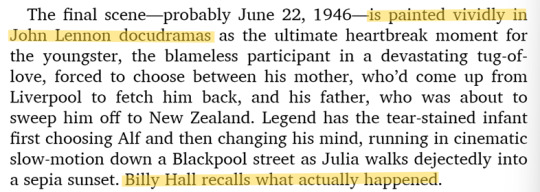
Lewisohn describes the well-known version of events as “painted vividly in John Lennon docudramas.” Again, Lewisohn neglects to inform the reader that this story comes from from Alf Lennon - one of the three people in the room where it happened. The “docudramas” didn’t make up this chapter in John’s life—they based it on the words of his father, and accounts of people close to John (e.g. Cyn.) We would expect Alf to have some bias in the matter, but that’s no reason to complete discount his story.
Also note Lewisohn’s use of charged language to highlight how melodramatic the “docudrama” version of events is. Silly of you to believe such made-for-TV sensationalism, reader! Luckily, Lewisohn has found someone who “recalls what actually happened.”
How Lewisohn knows this is “what actually happened”, he doesn’t say. But trust him—this isn’t just another version of events, it’s the version of events. Billy Hall says:

(The “Terry-Thomas character” mentioned here is Bobby Dykins, Julia’s boyfriend)
Right off the top, Hall says that the conversation happened in a different room. THIS is Lewisohn’s decisive witness—a guy who didn’t see things go down. Have you ever lived with someone, readers? Ever had a college roommate who got into a fight with their significant other in the other room? Even if you did your best to eavesdrop, would you be able to confidently say what happened if you were asked to recount it sixty years later? Would you weigh your word more heavily than the people in the room itself?
Billy Hall is only a “witness” in the loosest sense. He can tell us what happened around the fateful meeting, but he has no information on the actual event.
Billy tells us that Alf told him “I’m letting Johnny go back with his mother—she’s going to look after him properly.” Okay. Maybe Alf was broken up about events but wanted to save face in front of his friend. Maybe Alf wasn’t broken up, having just spent two weeks parenting after spending much of John’s life as an absentee dad. There’s nothing here that precludes a tense exchange occurring in the room. The room where Billy Hall wasn’t.
Finally, and damningly, “I really can’t remember if Johnny was in there too.” So Hall admits that he has no memory of the crucial detail of whether or not John was in the room, yet Lewisohn wants us to believe his account is “what actually happened.”
I commend Lewisohn for seeking out people like Hall, people peripheral to the Beatles’ story that may nevertheless add depth to it, but I seriously question his choice to present Hall’s version of events as definitive. He presents Hall’s story without question or criticism, outright telling us that a story told sixty years later by a man who wasn’t in the room where it happened is impartial and definitive. Meanwhile, Alf Lennon’s account isn’t attributed to him—it’s veiled behind catch-alls like “[e]very account”, or conflated with “docudramas.” Lewisohn clearly isn’t treating these accounts with equal scrutiny; he’s purposefully uplifting a version of events that contradicts accepted “myth.”
One final point that drives this home is Lewisohn’s choice to portray Billy Hall and Alf Lennon’s accounts as mutually exclusive. Rather than looking for how these two stories might dovetail, he creates a false dichotomy between them. This begins by framing the role of Billy Hall’s parents as crucial to the existing narrative, but it’s most clear in the utter absence of effort by Lewisohn to reconcile these two accounts. Aside from the point regarding his parents, what does Billy Hall contradict here? His portrayal is different from many dramatizations, but there’s very little that goes against Alf’s account. There’s no reason to completely throw out one or the other; there is every possibility these are two angles on the same story, not two mutually exclusive events.
But “Alf and Julia Lennon’s argument over John’s custody was maybe more sedate than sometimes depicted” isn’t getting headlines. It doesn’t make for a good talking point, and it certainly isn’t increasing Lewisohn’s prestige as the man finding out the True Story of the Beatles. Put simply, Mark Lewison chose to portray Billy Hall’s story as busting a Beatles’ myth not because a careful examination of the evidence supported that conclusion, but because disrupting a narrative would increase his profile and the profile of Tune In.
This isn’t an isolated example. We’ll see many of these tactics again with the story of Kim Bennett.
Sources:
Davies H. 1968. 2009 Edition. The Beatles. New York (NY): W.W. Norton & Company. 408p.
Lewisohn M. 2013. The Beatles: All These Years Vol. 1: Tune In. New York (NY): Crown Archetype. [ebook]
#mark lewisohn#tune in#the beatles#john lennon#alfred lennon#billy hall#kim bennett#lewi-sins#this is long as hell#oop
21 notes
·
View notes
Photo

Photo by Neal Preston.
“[George] said, ‘Oh, John would be a Wilbury in a second.’” - Tom Petty, Rolling Stone, January 17, 2002
“John Lennon was and always will be [a candidate for the Wilburys]. Peter Tork is a definite candidate. Michael Nesmith only if he gets back in his jeans and cowboy boots. Arlo Guthrie is most definitely a Wilbury (after all, his father, Woody, was an ancestral Wilbury). The MFQ, Flo and Eddie and Jan and Dean are definite Wilburys. Ron Wood, Keith Richards, Bill Wyman, Leadbelly, Fats Waller, Billie Holiday, Bessie Smith, Ethel Waters, yep.” - Audrey Zelenko, Daily News, March 9, 1989
“You might think the Wilburys myth satisfies some longing for the one experience George missed as a Beatle — a bunch of friends playing music for fun, unencumbered by the trappings of success.
‘In a way,’ he concedes. ‘But more than that it was that thing that went on in the late ‘60s and ‘70s, the big craze of supergroups and super jams and everything was super duper. Just getting some famous people together doesn’t guarantee success. More often than not it’s just a clash of personalities and a big ego detour.
‘So I thought we should play it down. Rather than the record company’s natural choice: Look what we’ve got! It took a while to give them the idea of ‘Let’s lighten up a bit.’” […]
‘What I saw as the Wilburys was an attitude, basically. I see loads of people out there who have what I call The Wilbury Attitude. Somebody wrote in a paper things like, ‘Little Richard is a Wilbury, Madonna wouldn’t be a Wilbury but Cyndi Lauper would be.’ It was quite funny.’” - Musician, March 1990 (x)
#George Harrison#Tom Petty#Roy Orbison#Jeff Lynne#Bob Dylan#The Traveling Wilburys#Wilburys35#quote#quotes about George#quotes by George#George and John#George and Tom Petty#The Wilbury Attitude#:)#(also the idea of George Tom and Peter Tork all in the same band makes my heart soar)#(anyway; long story short I <3 GH PT and TP)#(and I've long thought that Peter's banjo expertise alone would have made a great fit for the Wilburys)#Peter Tork#Michael Nesmith#et al#fits queue like a glove
86 notes
·
View notes
Note
Why were you afraid Maisie wouldn’t understand the beatles?
idk i think the whole like “yoko broke up the beatles myth” is absolutely drenched in misogyny and racism but there’s also the reaction to that that wipes away all her flaws when like. she’s still not a great person. so i was really afraid the maisie song was gonna flatten and girlbossify yoko in a way that makes my skin crawl AND THEN ITS KINDA PERFECT??? like!! a big big reason the beatles broke up because none of were able to/wanted to tell the others how much they loved each other, so they all got it in their heads that the other three didn’t care about them as much as they cared about the other three, and it just became this self fulfilling profecy. AND THE SONG IS ABOUT THAT EXACT THING HAPPENING IN MAISIE’S RELATIONSHIP, WITH A GUY WHO THINKS THAT NOT ONLY DID THAT SITUATION NOT HAPPEN BETWEEN HIM AND MAISIE, BUT IT DIDNT HAPPEN TO THE BEATLES EITHER. SO SHE NAMES IT YOKO BECAUSE THATS THE THING HE THOUGHT GOT IN THE WAY OF THE BEATLES AND THEN SINGS ABOUT THE THING THAT ACTUALLY CAME IN BETWEEN THEM. AND I SCREAMED!!!!
13 notes
·
View notes